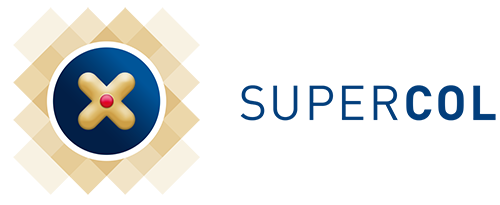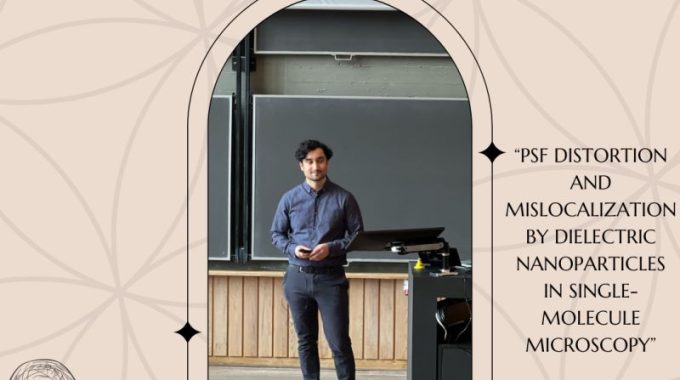
Meeting in Mainz marks next phase of SuperCol
Even though the pandemic situation continues to play tricks on the SuperCol project, recently the first physical meeting could be held. On November 8th-11th, the Max Planck Institute for Polymer Research MPIP hosted the workshop ‘Colloidal synthesis and colloid characterization’ that proved to be very beneficial for hands-on learning and establishing personal connections. Project coordinator Peter Zijlstra and a few of the SuperCol PhD students talk about their experiences in the first phase of the project.
In SuperCol six universities and two companies cooperate to train a total of 15 early-stage researchers in the exciting field of functionalized colloidal nanoparticles. Funded through the European Union’s programme in Marie Curie Innovative Training Networks, they explore the potential of these particles through the combination of super-resolution microscopy, colloidal sciences, and advanced modelling. Their ultimate aim is to rationally design surface-functionality and arrive at advanced particle-based biomedical applications – opening a potential for powerful diagnostic and therapeutic systems.

Unfortunately, SuperCol started right at the beginning of the corona pandemic in Europe. For the kick-off meeting about a year ago, the community resorted to the creative online environment of gather.town. Given the pandemic circumstances that was a fine solution but SuperCol coordinator Dr. Peter Zijlstra is very pleased that this year in Mainz he was able to welcome everyone in person. “SuperCol is all about the fundamental questions in the science of functionalised colloids, and those can only be answered through interdisciplinary collaboration. That was the main motivation to apply for this Marie Curie fund, but in the past 18 months this collaboration was of course frustrated because of the corona situation. In Mainz we experienced how important it is to really meet and be in touch with one another.”
According to Zijlstra the SuperCol project is reasonably on track despite the pandemic. “We managed to cope quite well. In a sense, we were able to get off to a flying start because it took two years for our application to be granted by the EU. So we had ample time to prepare.” Zijlstra admires the commitment and ambition of all PhD students. “It’s amazing how they have dealt with the lack of in-person contact. They’re very adept in using online facilities and have managed to form a tight team despite the travel restrictions. It shows their motivation and ambition to communicate and collaborate, which is exactly what we hoped for in this project.” He also mentions the role of former SuperCol project manager Laurens Schrijnemakers (recently succeeded by Berend van den Berge) who spoke personally to all PhD students on multiple occasions and ensured a good landing with the local host and in the project.

Inspiring environment
For Aleksandra Adamczyk, studying the nanoparticle-fluorophore coupling in controlled geometries with Prof. Guillermo Acuña at the University of Fribourg, the SuperCol community proves to be a very inspiring environment. She has a keen interest in light – matter interactions and considers herself lucky: “Firstly, the lab I joined and the techniques I am using are exactly what I was hoping for. Secondly, I already obtained very interesting results and every month my project is growing and moving forward. So for me, SuperCol is a great opportunity. Not only to contribute in developing particular fluorescence techniques for biomedical applications, but also to work with people from different fields. SuperCol people are super cool!”
To this Masih Fahim fully agrees. He really appreciates the value of being part of the SuperCol network. “It is very motivating and supporting to have people to talk to – people who are not competitors but colleagues, with a different expertise and at the same time completely familiar with your project.” Masih is working at the Technical University of Denmark under the supervision of Prof. Rodolphe Marie, developing methods to efficiently screen different chemical conditions under which the SuperCol consortium will acquire super-resolution images. He found the pandemic rather challenging with respect to settling in a new country, but considers himself lucky that it did not affect his research too much. “We have been able to enter our labs most of the time, amongst others thanks to testing facilitated by the state of Denmark.” He has experienced the SuperCol community as very active thanks to great representatives and a good administration. “The online meet-ups and the compensation of missed courses in a digital format have been very nice.”


Even with small steps there’s progress
For Maria (Anto) Ramirez the pandemic came with a serious delay: she couldn’t join until a few months after the start. “But from day one, I felt welcomed and supported”, she says. “Then, I discovered the superpower that is here, starting with the opportunity to not only work in a laboratory, but to also travel and learn about other forms of work and complement my training”. She works at SuperCol partner HiQ-Nano, a spin-off company from the Italian Institute of Technology focused on the design, fabrication and characterization of high-quality nanoparticles. Her PhD research on the tailored synthesis and functionalisation of nano-and microscopic colloidal particles is supervised by Prof. Giuseppe Agostino Mele at the University of Salento. “So far, everything has gone well, at the beginning faster than now, but even with small steps there’s still progress. There are so many questions to ask and solve to achieve a functional nanosystem, especially when it comes to a bio-application. But I hope to achieve a result that is scalable beyond a PhD thesis, into a real product.”
At the Max Planck Institute for Polymer Research we find Francesca Mazzotta, working on the synthesis of Janus nanoparticles (colloids with two faces, meaning an anisotropic structure) under the supervision of Dr. Ingo Lieberwirth. Her initial interest was more in the microscopy field, which she hopes to focus on eventually. Research wise the past months have been quite tough, she says: “Lacking any experience I had to learn so many new things! But it has been very exciting.” She applied for the SuperCol position because she wanted to work in an interdisciplinary setting and she really feels in contact with her fellow students. “I love this community”, she says. “I came for the teamwork and I really feel we are a team!”. She did struggle with the pandemic situation though. “Even at my own institution it was hard, not being able to chat with my colleagues and get to know them. It has made it difficult to speed up my learning process. Since the covid situation has improved I can see how my work has also improved.”


Finally, we talk to Vincenzo Lamberti who works on light-controlled deterministic particle functionalization at Eindhoven University of Technology under the supervision of Peter Zijlstra. Being trained as a theoretical physicist his ambition is to focus on real applications and achieve practical research outcomes. “In SuperCol I found the perfect environment to dive into something I discovered during my Master’s research: the fascinating world of microscopy at its highest resolution.” After a year of struggling with his initial assignment he decided to shift focus, and successfully so: “When the first experiment succeeded at the first attempt, I can honestly say I was the happiest person on earth. From there on, I’m hoping to get closer and closer to an application-ready setup that can be used as a biosensor to detect rare and specific DNA mutation and help prevention in health care.” Vincenzo feels at home in the SuperCol community: “We are all committed to achieving research goals to bring innovation and contribute on multiple topics. All this effort is wrapped in a context of multicultural friendship and expertise within a wide yet focused range.”
Full of confidence
Peter Zijlstra is full of confidence and expectations regarding the next phase of the project: “I am excited that the exchanges and secondments will commence later this year and I look forward to many collaborations that will no doubt advance the field of super-resolution microscopy of colloids and their applications!”



